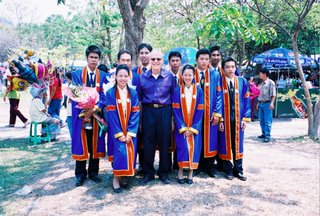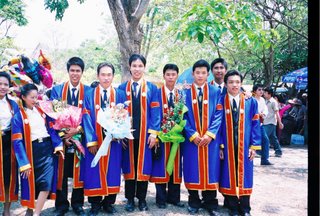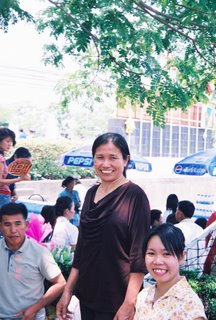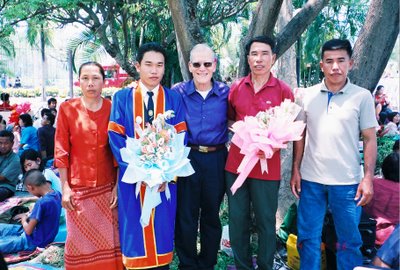
Even though Wiwat attended college in Chiang Rai, his graduation ceremony took place in Chiang Mai, the year following the completion of his bachelor's degree. This was for the convenience of the crown prince. Every college graduate in Thailand, of which there are tens of thousands per year, personally receives his diploma from a member of the royal family, an honor that is universally respected and is a major, perhaps
the major, event in their lives. To make this task possible for the royal family, the ceremonies are consolidated so that this year, all of last year's graduates from the north of Thailand, converged on Chiang Mai. There being no building in Chiang Mai large enough to hold the graduates
and their family and friends, only the crown prince and the graduates themselves witnessed the degrees being bestowed, although an abbreviated few minutes could be viewed on TV during the nightly royal news program. On graduation day, the assembled throng sat on the grounds of Chiang Mai University and had a big picnic. Most brought their own food, but there was plenty for sale from vendors also. It was April 8, a Sunday, and extremely hot (April is Thailand's hottest month).

Left: The lucky few got a spot under a temporary
tentWiwat's family generously offered to share with me whatever food they brought with them from Chang Kom, which is near the Laotian border, but having eaten Lana food when I visited their village several years ago, I politely declined.

Wiwat, now about 23 years of age, looked resplendent in his graduation attire, as did his friends. I don't know how I fit in, but they wanted me to get in a picture with them. In the group picture,
left, Wiwat is the last person on the right in the front row.
The custom is for family and friends to give their graduates a bouquet of flowers, and vendors set up numerous stalls to sell gorgeous fresh flower bouquets at a price of about US$5 each.

One of many stalls selling traditional graduation bouquets

All graduates received at least one bouquet
I had already attended a graduation at Chulalakorn University in Bangkok, and I knew about presenting flowers to the graduates. But Jamnong told me about a friend of his who made bouquets out of money, the gifting of money being a part of the Thai graduation tradition also. I was going to give Wiwat a cash gift anyway, and the idea of combining the money with the flowers appealed to me, although I had no idea what it would look like. I placed my order with Jamnong about a month prior to the graduation and waited. Fortunately, Jamnong offered to carry the money bouquet for me to Chiang Mai from Bangkok.
 Jamnong & Nui Arriving at the Chiang Mai Airport with two money bouquets from Bangkok in hand--one for them, and the other for me, to give Wiwat at his graduation in a few hours. Nui is about three months pregnant with her first child.
Jamnong & Nui Arriving at the Chiang Mai Airport with two money bouquets from Bangkok in hand--one for them, and the other for me, to give Wiwat at his graduation in a few hours. Nui is about three months pregnant with her first child.
I was pleasantly surprised at how creative and beautiful the bouquet looked. The flowers themselves are made from 100-baht notes (each note about US$2.50).

I first met Wiwat in Bangkok, about six years ago, while he was visiting Jamnong and Nui. They're not related, but they come from the same village, a strong tie in Thailand. Wiwat's mother died when he was young and his father, an impoverished farmer, couldn't afford to keep and educate Wiwat, so, at age eight, Wiwat entered the monkhood and, until age 18, lived and was educated at the local wat (temple). At age 18, he left the monkhood and traveled to Bangkok to find a job. He must have done well at the wat, because when I visited Chiang Kham in Phayao province, a photo of Wiwat with one of the revered monks, was on display at the wat. Unfortunately, he did not do so well in Bangkok, where he worked for, and slept in, a small electrical manufacturing shop of some sort, put in inhumane hours, was treated badly by his boss, and was paid about $125 a month. While working, he tried to continue his education at the free university in Bangkok, but, after a while, exhausted, he returned to his village. Bangkok proved too much for him.
I saw Wiwat again sometime later, when I stayed with Jamnong and Nui in their village during Songkran. I also met Wiwat's father, step-mother, and extended family. I knew that Wiwat wanted to go to college and that there was no apparent way for him or his family to pay for it. At that time, I didn't speak Thai, but Jamnong's English is quite good and he acted as translator. I had concluded the night before, that I wanted to pay for Wiwat's college tuition and Jamnong told me about how much it would be for a four-year degree course in Chiang Rai, where Wiwat wanted to attend one of the liberal arts colleges. I was amazed at how cheap it was; books alone at a US college would cost more. It was a go, provided Wiwat and his family would agree to pay for his living and incidental expenses. At a meeting with Wiwat, his father, and Jamnong, at Wiwat's house in the village, I made the proposal and explained the terms. They accepted, and so it was a deal. Wiwat would start school immediately.
The procedure was simple. For four years, Wiwat sent the tuition statements to Jamnong in Bangkok, who would show them to me. I gave the tuition money to Jamnong and he would transmit it to Wiwat, who would obtain a receipt from the school, send it to Jamnong, who, in turn , would give it to me, at all times translating the Thai for me. Each semester, Jamnong gave me Wiwat's grade transcript and explained to me the courses that Wiwat had taken and the results, mostly A's and B's. Wiwat worked some and, from time to time, returned to his village to help his father in the fields, but he studied diligently and consistently and finished his degree on time. Because Wiwat doesn't speak any English, and because I was just beginning to learn Thai, we didn't communicate much, even though we "spoke" over the phone several times a year, sometimes with Jamnong translating, and at other times directly, always an uplifting experience for me inasmuch as Wiwat always told me, in Thai, diplomatically, how well I was speaking. When graduation day finally arrived, I met Wiwat's family for the first time in five years and we had a grand time eating and talking at the ceremony.


Above: Wiwat's Dad (standing)
Right: Nui's Mom

Wiwat's Step-mother, Wiwat, Me, Wiwat's Dad, Nui's Dad
We were seated near the entry road to the university, where the crown prince's motorcade was to pass on it's way to the graduation hall. Police, security officers, and the army were plentiful and selected students lined both sides of the road. The police announced over loudspeakers that we should be ready for the crown prince. We waited, and about 20 minutes later, the police announced that the crown prince was delayed and that we would be told later, when he would arrive. By this time, I had been in the intense heat for many hours with little shade and, even though I had had a lot of water to drink, I felt a little weak and decided to call it a day and to return to my hotel in the center of town near the night bazaar. Jamnong and Wiwat found a cab for me, which I happily entered.
On the way back to my hotel, I passed through the most severe electrical thunderstorm that I can recall experiencing. About half a block in front of the cab, I saw and heard, for the first time in my life, lightning descending and knocking out a power line transformer. The streets quickly began to flood, but the biggest danger was the high wind felling trees and blowing sometimes heavy debris onto the cab's path. There was nothing I could do about it and I was more relaxed while it was occurring, than I was afterwards, or now, reviewing it in my mind. Fortunately, the storm ended quickly and I was safely back at the hotel. I found out later from Jamnong, that a few minutes after I left the grounds, the storm hit there also and they scattered in trucks and whatever else they could find. Wiwat proceeded indoors to wait for the crown prince and his diploma, but for the rest of us, the graduation was over.















